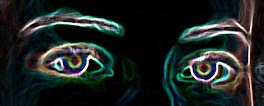
Yay! I finally got a face shot out of my awkward fingers and shy avatar :)
The experience in the classroom on Thursday really contributed to my enjoyment of Second Life itself. Camera moves? check. Flight school? check. Teleport? check. Gestures? check. Chatting? check. However, among all those technical accomplishments, the lab accentuated the uncanniness of virtual reality. Considering it afterward, I realized that what bothered me most was the loss of social norms.
Somehow the familiarity bred through mediated communication breaks down the comfortable interaction provided by social norms (such as a authority) and generic structure (such as "how are you? fine, you?"). We discussed the comfort of generic conventions in my film course, and I believe the same phenomenon appears in Second Life. In a classroom, one knows what to expect from the teacher and from the students; but juxtaposing a classroom setting and its existing hierarchy alongside an amorphous society simultaneously made me uncomfortable. With so many people able to interject into a conversation through the chatting feature, it was difficult to follow trains of thought and respond with appropriate timing and content to the appropriate person. I do not lack that kind of experience---AIM consistently distracts me from writing papers--but meeting in a virtual class is much different than debriefing with friends after a long day.
Virtual reality is indubitably powerful. I can definitely see it's advantages in connecting people regardless of their location, accessibility, etc. However, it does not seem to accommodate for the various social genres that form the backbone of our ability to clearly communicate with one another. Expectations provide a framework against which to cast innovations or to support maintenance.
I am definitely open to learning the genre of virtual communication, but at first glance it strikes me as insufficiently broad to envelope something as complex and intricate as successful human communication.
